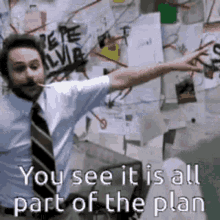Planning everything vs being spontaneous
Plus, how to prevent people from rambling during business meetings, the best time to write, and more.
The corporate culture consultant Erin Meyer gave a talk at a large corporation in the US. She was given exactly 45 minutes to do the talk.
Not 44 minutes and not 46 minutes. There was somebody in front of her holding up cards that said “20 minutes left”, “10 minutes left”, “5 minutes left”, etc. And when her 45 minutes were up, she had to leave the stage immediately so the next speaker could come talk.
Shortly afterwards, she went to Brazil to give the same talk. “It’s a 45 minute talk,” she said. “Is that okay?”
“Don’t worry if you run overtime. If your talk takes 60 minutes, that’s fine,” said the guy who hired her. So Meyer prepared her talk to last exactly 60 minutes.
Meyer talked for exactly 60 minutes, then stopped. The guy who hired her pulled her aside and said, “why did you stop? The audience was enjoying your talk! They were clamoring for more!”
Meyer wrote about this in her book The Culture Map. Her point is that some cultures have more rigid planning and some cultures have more flexible planning.
At the extreme, some businesses in places like Germany or the United States plan their meetings down to the minute. They’ll spend exactly 5 minutes talking about expansion to Southeast Asian markets, exactly 3 minutes talking about TV advertising, exactly 7 minutes talking about accounting — you get the picture.
Imagine the TV advertising people bring up something really interesting. You want to have a deeper conversation to explore this further, so you ask some follow-up questions. Then your boss says “sorry, we only allotted 3 minutes to talk about TV advertising,” and moves onto the next subject.
In other cultures they’ll think you’re stupid if you plan your meetings like that. Their meetings are flexible and mostly unplanned, so they can explore whatever conversation threads come up that they decide are worth exploring.
Neither culture is right or wrong. Both approaches have strengths and weaknesses. Let’s check those out:
Planning Everything
When you plan everything in advance, you can save time and stick to your schedule better. This is really important when you’re coordinating large groups of people. A good example is trains. People expect trains to run on time. So much so that in Japan, when a train left 25 seconds early, the rail operator issued a public apology.
(In fact, the whole reason why mechanical time was invented was so that all the different towns in England could get on the same page about railroad schedules.)
It’s also really important when your time is valuable. If you’re in a huge hurry or you’re on a tight deadline, you might want to squeeze the most out of every second.
Another benefit to planning everything in advance is that you’re more likely to make good long-term choices. Once upon a time some people did an experiment where they had people choose what meals to eat in the cafeteria. Half of the people in the experiment chose what to eat for lunch right when lunch started; the other half chose what to eat earlier in the day. Guess who was more likely to make a healthy choice?
The same thing can happen in meetings. In meetings, everyone is tempted to ramble on and on about whatever subject is important to them. By capping the amount of time you spend talking about one subject, you prevent people from getting seized by a desire to ramble about nonsense.
Being Spontaneous
There’s a saying that “no plan survives the battlefield.” There’s another saying that “everyone has a plan until they get punched in the face.”
The problem with being rigid is that you can’t possibly predict everything that’s gonna happen in advance, so if you’re too rigid, you’ll miss a lot of opportunities. The advantage of going with the flow is that it lets you adapt to new information.
For example, sometimes I start my day expecting to get a bunch of work done, but then I get inspired to write one of these articles. When I’m struck by inspiration to write one of these articles, I immediately write as much of it as I can before I lose inspiration. That’s because I’m a way better and more productive writer when I’m actually inspired to write.
Being spontaneous is also just way more fun. People didn’t evolve to stick to a rigid schedule — they evolved to choose what to do based on what mood they were in, what their needs were at the moment, et cetera. Rigidity can kill creativity.
Which should you use?
Peyton Manning was the biggest planner of all time. No quarterback in the history of the NFL was better at studying his opponent’s tendencies.
But on the field, Peyton Manning often didn’t have a plan. In most NFL teams, the coach calls the play from the sideline and then the quarterback tells the rest of the offense the play in the huddle. But on a lot of Peyton Manning’s Colts teams, the Colts offense didn’t huddle at all. Instead, the offense would line up, and then Manning would read the defense and then call a play.
When most people think about planning, they think about specific planning, which is where you plan things down to the smallest detail. But Peyton Manning’s planning did flexible planning, or planning that generally helps you in any situation you might face.
Specific planning helps you be prepared if everything goes right. Whereas flexible planning helps you be prepared no matter what.
I generally recommend doing more flexible planning than specific planning. Make plans, but be ready to change your plans — or completely throw your plans out the window.
Hey! Thanks for reading.
My name’s Theo and every other Monday I write an article like this one about whatever was on my mind the week before. Usually related to psychology, social sciences, or the way the world around us works.
If you liked this article, you might also like my article called “The Good And Evil Paradox”:
You can also hit the purple “subscribe now” button below:
Happy trails!










When I ran a meeting, I definitely had an agenda, but not one with time limits. I also had a recorder to take down action items that were decided upon at the meeting. I, as leader, acted as "time keeper", stopping the discussion when it started to wander and asking for or assigning action items, then moving on to the next topic.